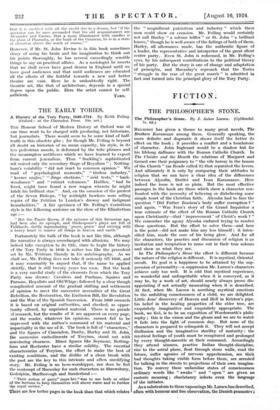THE EARLY TORIES.
A History of the Tory Party, 1640-1714. By Keith Felling. (Oxford : at the Clarendon Press. 188. net.) TIIE Honour School of Modern History at Oxford was at one time wont to be charged with producing, not historians, but journalists. There would seem to be some kind of half-
truth in this obsolete gibe ; for though Mr. Feiling is beyond all doubt an historian of no mean capacity, his style, in its less pedestrian moods, is deformed by the trite phrases and the meaningless antitheses which we have learned to expect from current journalism. Thus " Suckling's sophisticated wit voiced only the secondary Stage of Royalism " ; Notting- ham's volubility "did not react to common opinion." We read of "psychological moments," "tireless industry," "keener angles," "Jingo elections," "acid tests," " back- woodsmen " and "extinct volcanoes." Halifax, "had he lived, might have found a new wagon whereto he might hitch his brilliant star." And, on the occasion of the protest of the Seven Bishops, "by midnight hawkers were selling Copies of the Petition to London's drowsy and indignant householders." A fair specimen of Mr. Feiling's Corinthian style is the following sentence on the close of the Elizabethan age :—
" But the Faerie Queen, if the epitome of this Saturnian age, had been also its epitaph, and Shakespeare's plays are full of Falklands, shrilly ingemmating peace, peace' and striving with a heavy heart to master all things in heaven and earth."
Fortunately the bulk of the book is not like this, although the narrative is always overcharged with allusions. We may indeed take exception to its title, since to begin the history of the Tory Party in 1640 is rather too like the precedent set by Mr. Tristram Shandy in his autobiography. As we shall see, Mr. Feiling does not take it seriously till 1660, and it may reasonably be argued that, if the name be applied strictly, that is still twenty years too soon. But the book is a very careful study of the elements from which the Tory Party was drawn : Cavaliers and Puritans, Squires and Parsons, Royalists and Old Whigs : followed by a clear though complicated account of the gradual shifting and settlement
of opinion to meet the successive necessities of the Great Rebellion, the Restoration, the Exclusion Bill, the Revolution
iind the War of,the Spanish Succession. From 1660 onwards it is based on original authorities, and checked, as oppor- tunity offered, by imprinted material. There is no parade af research, but the results of it are apparent on every page, and the reader, whatever his opinions, cannot fail to be impressed with the author's command of his material and knpartiality in the use of it. The book is full of "characters,"
and the figures of "Clarendon, Danby, Harley and St. John, the successive embodiments of Toryism, stand out with
convincing clearness. Minor figures like Seymour, Notting- ham and Rochester have a similar solidity. The essential characteristics of Toryism, the effort to make the best of existing conditions, and the dislike of a clean break with the past are the key to this intricate and often unedifying story. Mr. Felling is no hero-worshipper, nor does he feel the contempt of Macaulay for such characters as Shrewsbury, Godolphin, Marlborough and Sunderland :— "Their notion of party" (says he) " vitas to use both or either of the factions to keep themselves well above water and to further the royal service."
There are few better pages in the book than that which relates
the "magnificent patriotism and industry" which these men could show on occasion. Mr. Felling would certainly not call Harley "a solemn trifler" or St. John "a brilliant knave," though he is well aware of the failings of both of them. Harley, all allowances made, has the authentic figure of a leader, the representative and interpreter of the great silent centre party. Even St. John is redeemed, in Mr. Feiting's eyes, by his Subsequent' contributions to the political theory of his party. But the story is one of change and adaptation of principles, and Macaulay's reproach that the Tories "straggle in the rear of the great march" is admitted in fact and turned into the principal glory of the Tory Party.


































 Previous page
Previous page